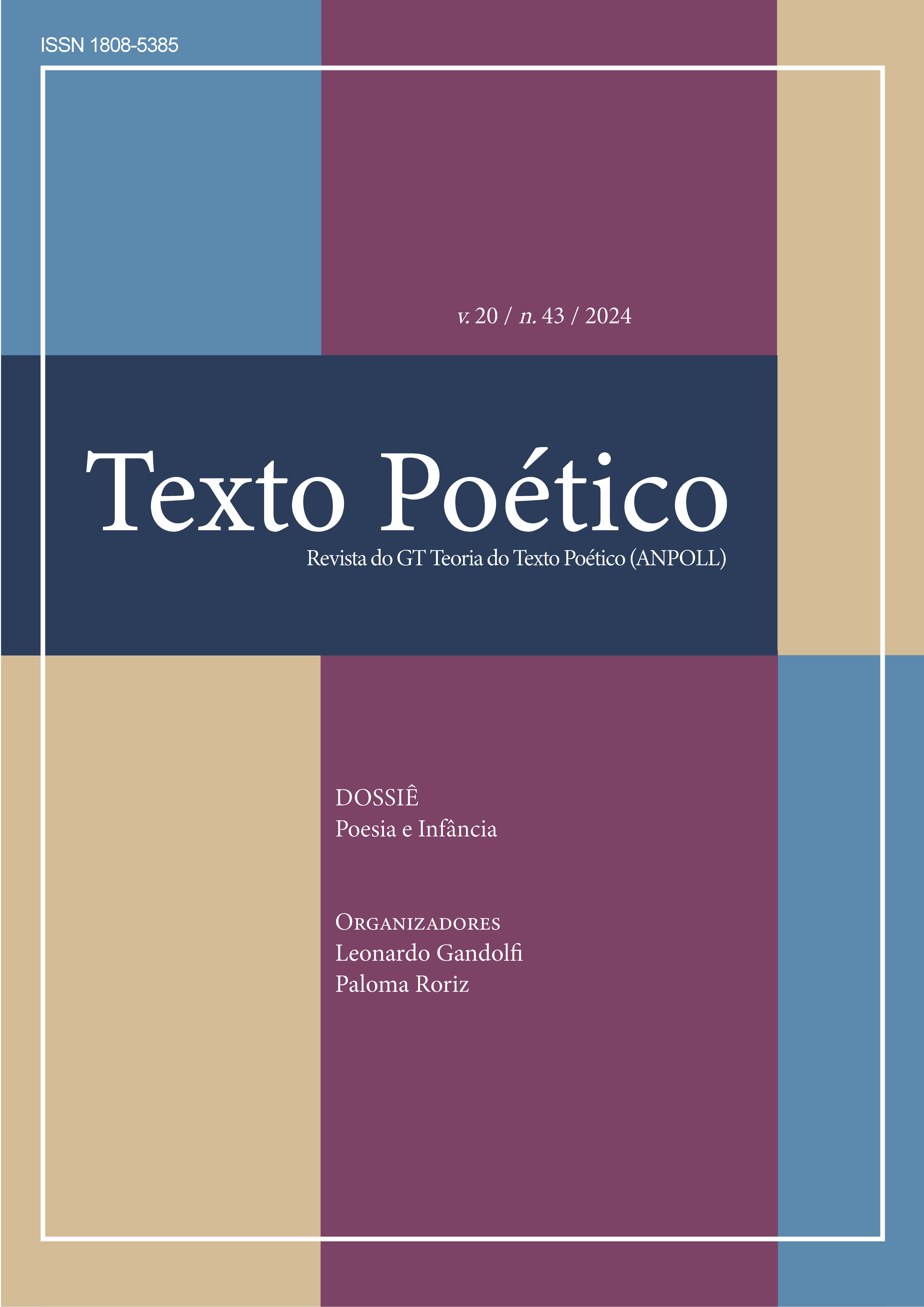Luddism and sampler writing in Marcelo Montenegro’s poetry
DOI:
https://doi.org/10.25094/rtp.2024n43a1125Keywords:
Marcelo Montenegro, Sampler writing, Children’s gameAbstract
Marcelo Montenegro’s poetry, through frequent use of selection, cutting and fragment editing, can be understood as sampler writing. Manipulation of pre-existing forms and texts makes his creative process as like children’s game, according to Johan Huizinga (2019) and Paloma Roriz (2023). In this paper, it is not intended to study childhood as a theme, nor looking for representations of the child throughout the verses, but to comprehend sampling in poetry as a way of operating with language analogous to the act of the child breaking the toy, resulting, as a consequence, in other senses for everyday life.
References
ABREU, Luis Felipe. “Políticas de impropriedade em certa poesia contemporânea: vidas rasteiras, de Alberto Pucheu”. In: PUCHEU, Alberto & MAGALHÃES, Danielle. Falemos de poesia. Rio de Janeiro: 7 Letras, 2023, p. 203-213.
BOURRIAUD, Nicolas. Pós-produção: como a arte reprograma o mundo contemporâneo. Tradução de Denise Bottmann. São Paulo: Martins Fontes, 2009.
GARRAMUÑO, Florencia. Frutos estranhos: sobre a inespecificidade na estética contemporânea. Tradução de Carlos Nougué. Rio de Janeiro: Rocco, 2014.
HUIZINGA, Johan. Homo ludens. Tradução de João Paulo Monteiro. São Paulo: Perspectiva, 2019.
FONTELA, Orides. Poesia reunida. São Paulo: Cosac Naify, 2006, p.18.
GASPAR, Mauro. Invasores de corpos: atravessando o laboratório de Ricardo Piglia. Orientador: Karl Erik Schollhammer. 186f. Tese (Doutorado em Letras) - Pontifícia Universidade Católica do Rio de Janeiro, Rio de Janeiro, 2008.
GOLDSMITH, Kenneth. Uncreative writing. New York: Columbia University Press, 2011.
MONTENEGRO, Marcelo. Orfanato portátil. Londrina: Atrito Art, 2003.
MONTENEGRO, Marcelo. Garagem lírica. São Paulo: Annablume, 2012.
MONTENEGRO, Marcelo. Forte apache. São Paulo: Companhia das Letras, 2018. MONTENEGRO, Marcelo. Vídeos caseiros. São Paulo: Corsário-Satã, 2021.
MONTENEGRO, Marcelo. O livro do ouvido. São Paulo: Miolo Mole, 2023.
PERLOFF, Marjorie. O gênio não original: poesia por outros meios no novo século. Tradução de Adriano Scandolara. Belo Horizonte: UFMG, 2013.
RANCIÈRE, Jacques. João Guimarães Rosa: a ficção à beira do nada. Tradução de Inês Oseki- Dépré. Belo Horizonte: Relicário, 2021.
RORIZ, Paloma. “Rachaduras na página: notas para uma segunda infância”. In: BASÍLIO, Rita et al. Manuel António Pina: outras passagens - ensaios. Lisboa: Textiverso, p. 147-158.
SAMOYAULT, Tiphaine. A intertextualidade. Tradução de Sandra Nitrini. São Paulo: Hucitec, 2008.
TRANQUEIRAS LÍRICAS. [Marcelo Montenegro e Fábio Brum]: Marcelo Montenegro. São Paulo: Estúdio Jaburu, 2017. 1 CD.
VARGAS, Herom et al. “Remix e sampling: identidades e memória dos DJs na música eletrônica". Revista Famecos. v. 25, n. 2, p. 1-18. Disponível em: <http://dx.doi.org/10.15448/1980- 3729.2018.2.28156>. Acesso em 25 mai 2024.
VILLA-FORTE, Leonardo. Escrever sem escrever: literatura e apropriação no século XXI. Rio de Janeiro: Ed. PUC-Rio, 2019.
Downloads
Published
How to Cite
Issue
Section
License
I authorize the Texto Poético Journal to publish the paper of my authorship/responsibility that I now submit, in case it is accepted for online publication.
Moreover, I declare that this contribution is original and that it was not submitted to any other editor for publication.
The copyright of the works published at the virtual space of the Texto Poético Journal are automatically entitled to the journal. Their total or partial reproduction is conditioned to the authors' citations and publication data.

Texto Poético is licensed under a Creative Commons - Attribution-NonCommercial 4.0 International (CC BY-NC 4.0).









